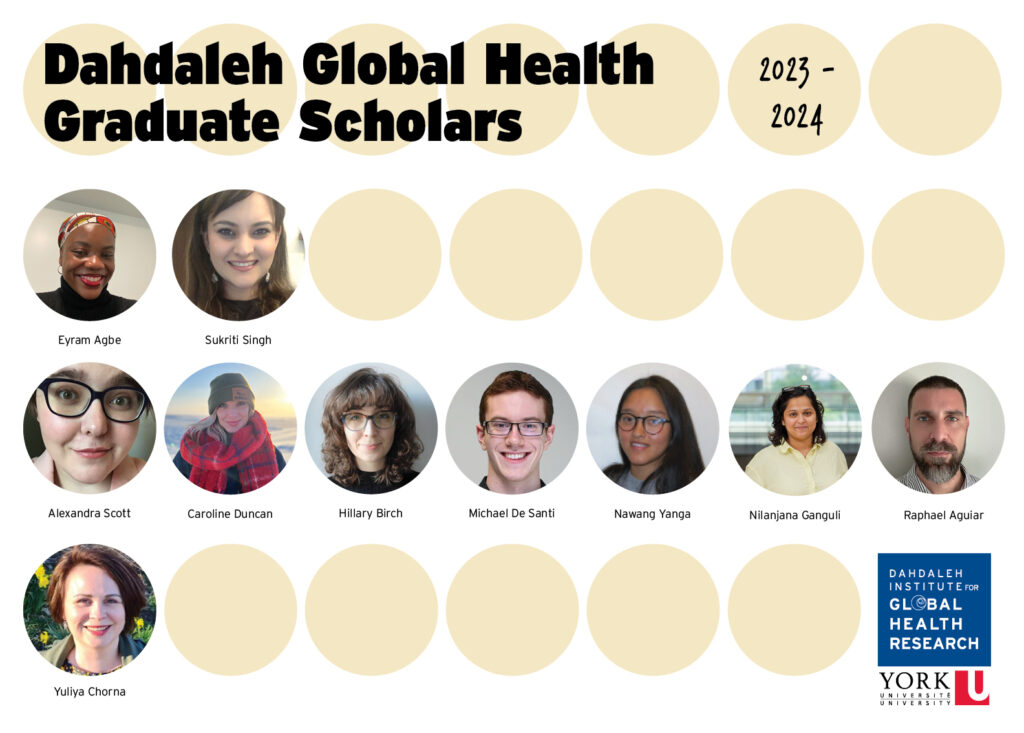
[tta_listen_btn listen_text=”Click to listen to this story” pause_text=”Pause” resume_text=”Resume” replay_text=”Replay” start_text=”Start” stop_text=”Stop”]
Ten scholars will advance York University’s growing global health research community as recipients of the 2023-24 Dahdaleh Global Health Graduate Scholarship.
The program was created to support graduate research and related scholarly and creative activities in line with the three themes of the Dahdaleh Institute: planetary health; global health and humanitarianism; and global health foresighting. The scholarship is granted annually to graduate students who demonstrate outstanding academic achievement in global health research.
This year, the Dahdaleh Institute renews seven exceptional scholars and welcomes three new graduate students from the Faculty of Graduate Studies, the Lassonde School of Engineering and Osgoode Hall Law School.

This year’s new recipients are:
Alexandra Scott – The Myth of “Good Enough”: Law, Engineering, and Autonomous Weapons Systems
Scott is a PhD student, Dahdaleh Global Health Graduate Scholar, and Social Sciences & Humanities Research Council doctoral Fellow at the Osgoode Hall Law School at York University. Scott’s work explores the development and deployment of autonomous weapon systems (also known as “killer robots”) under international law and the role that engineers play in both.
“Beyond providing me with the financial means to pursue my PhD studies, my involvement with the Dahdaleh Institute has already allowed me to not only collaborate with and learn from esteemed academics, but become involved with research areas I had long hoped to delve into but could never quite figure out how,” says Scott. “The Dahdaleh Institute has already opened several doors to me and I am thankful to be part of such a welcoming and supportive program.”
Caroline Duncan – Optimizing Water Safety in Cambridge Bay Using Participatory System Dynamics
Duncan is a PhD candidate in civil engineering with a strong focus on optimizing drinking water in the Arctic using participatory approaches to system dynamics modelling. As part of the Lassonde School of Engineering, and under the guidance of Professor Stephanie Gora, her research seeks to understand the complex factors that affect the quality and accessibility of drinking water in the Arctic using an interdisciplinary and participatory approach.
Through her research, Duncan will work closely with the Municipality of Cambridge Bay, Nunavut, collaborating with community members, government and non-governmental organization stakeholders involved with drinking water from source to tap. Through this collaboration, a model will be developed to test treatment and policy interventions to optimize drinking water safety.
Eyram Agbe – Digital deprivation: ICT education and social vulnerability in Ghana
Agbe is a master’s student in the Development Studies program. Her research seeks to understand the diverse psychosocial impacts of COVID-19 on basic school teachers in Accra, Ghana, and how these factors affect their ability to support new curriculum implementation as schools have returned to in-person classes. This study seeks to centre the critical role that social vulnerability plays in education, specifically how teachers’ health outcomes are situated within contentions over techno-political visions by stakeholders.
With the commencement of a new school year, the Dahdaleh Institute is excited to see the continued excellence and remarkable research of all the Dahdaleh Graduate Scholars. Those renewed will be exploring the following research areas:
- Hillary Birch – More than Access: The urban governance of water quality in Lusaka, Zambia;
- Michael De Santi – Improving Water Safety in Humanitarian Response with a Novel AI-Enabled Quantitative Microbial Risk Assessment Model;
- Nawang Yanga – Tuberculosis in Tibetan Refugee Settlements in India: Insights into Lived Experiences;
- Nilanjana Ganguli – Assessing community resilience to the gendered health impacts of climate change in Malawi’s Lake Chilwa Basin;
- Raphael Aguiar – Urban Political Ecologies of AMR and other interdependent threats;
- Sukriti Singh – Building a Model of Global Mental Health Governance to Support the Mental Health of Health Professionals; and
- Yuliya Chorna – Anthropology of global health policy-making and financing of Tuberculosis response.
To learn more about the research projects graduate student scholars are undertaking, visit yorku.ca/dighr/ten-exceptional-scholars-awarded-2023-2024-dahdaleh-global-health-graduate-scholarships.
